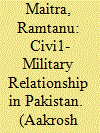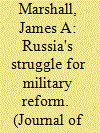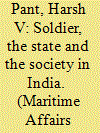| Srl | Item |
| 1 |
ID:
132792


|
|
|
|
|
| Publication |
2014.
|
| Summary/Abstract |
A significant number of countries around the world have been stuck a cycle of military rule followed by civilian rule followed by military rule for decades. The cycle is seemingly unbreakable because both groups, for their own reasons, reject a fully mature political process. Many of the countries with this pattern of governance are located in South America and Africa. But Asia host at least two such nations, densely populated countries of Pakistan and Indonesia.
|
|
|
|
|
|
|
|
|
|
|
|
|
|
|
|
| 2 |
ID:
132446


|
|
|
|
|
| Publication |
2014.
|
| Summary/Abstract |
This article assesses the recent attempts to reform the Russian military and the future prospects of successful reform. Despite serious social and economic ailments, Russia should still be able to modernize its military; however the key obstacles to reform lie in its leadership's inability to shape existing resources into military capabilities. First, the article examines the decay in Russia's manpower, defense budgeting, and defense industrial base. Second, the article surveys the security environment in which Russia must tailor these strategic resources. However, the state of these resources and Russia's security needs do not justify the capabilities that the Russian military has developed. Therefore, the article identifies Russia's inability to transform resources into capabilities as the missing link in military reform. Specifically, these poor 'conversion capabilities' include dysfunctional civil-military relations, misguided threat assessment and strategy formulation, and opaque doctrine. Finally, the article concludes that absent any external existential threats or a military disaster, successful military reform is unlikely, with implications for both the threshold at which Russia decides nuclear weapons are necessary as well as its perceived need for strategic depth.
|
|
|
|
|
|
|
|
|
|
|
|
|
|
|
|
| 3 |
ID:
133672


|
|
|
|
|
| Publication |
2014.
|
| Summary/Abstract |
These are difficult times for civil-military relations in India. They may appear normal superficially but lurking beneath the surface are serious differences. "More than ever the balance between the Indian state, the Indian society and the nation's military institutions is out of kilter. This can have grave implications if the equilibrium is not promptly restored because only nations which are successful in evolving a properly balanced pattern of civil-military relations succeed in their search for security while those who fail, merely end up squandering their limited resources and put their national security at risk". While the Indian State cannot absolve itself of the way it has handled the nation's military, Indian military also needs to do some serious introspection. "Blaming the government for all the ills afflicting the defence sector seems to be becoming the default position within the ranks of the military and taking this too far can be really dangerous for the liberal democratic ethos of this nation".
|
|
|
|
|
|
|
|
|
|
|
|
|
|
|
|